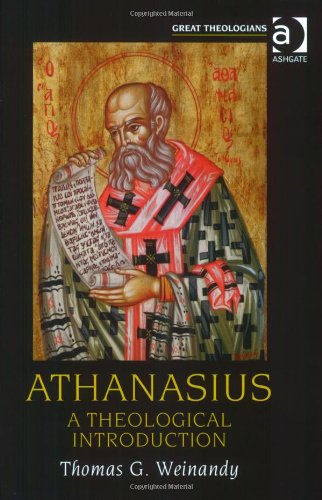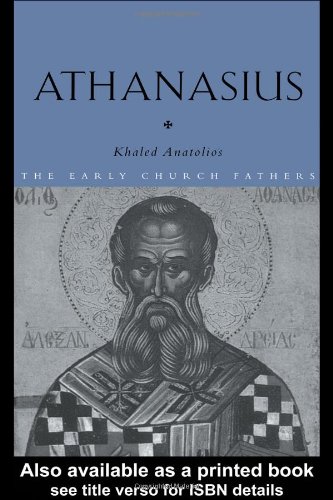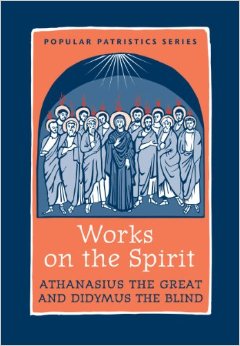|
Relevant
books available at Amazon
Many Athanasius
studies
and translations with links to Amazon
--------------
STUDIES (Click on images below.)
 
Athanasius of Alexandria
David M. Gwynn --------------
 
Athanasius
Peter J. Leithart --------------
 
Athanasius: A Theological Introduction
Thomas G. Weinandy --------------
TRANSLATIONS
 
Athanasius
Khaled Anatolios --------------
 
On the Incarnation
John Behr --------------
 
Works on the Spirit
Mark DelCogliano et al. --------------
 
The Life of Antony and the Letter to Marcellinus
R. C. Gregg -------------- |
29. Now the scope and character of Holy Scripture, as
we have often said, is this,—it contains a double account of the Saviour; that
He was ever God, and is the Son, being the Father’s Word and Radiance and
Wisdom; and that afterwards for us He took flesh of a Virgin, Mary Bearer of God
, and was made man. And this scope is to be found throughout inspired Scripture,
as the Lord Himself has said, ‘Search the Scriptures, for they are they which
testify of Me.’ But lest I should exceed in writing, by bringing together all
the passages on the subject, let it suffice to mention as a specimen, first John
saying, ‘In the beginning was the Word, and the Word was with God, and the Word
was God. The same was in the beginning with God. All things were made by Him,
and without Him was made not one thing;’ next, ‘And the Word was made flesh and
dwelt among us, and we beheld His glory, the glory as of one Only-begotten from
the Father;’ and next Paul writing, ‘Who being in the form of God, thought it
not a prize to be equal with God, but emptied Himself, taking the form of a
servant, being made in the likeness of men, and being found in fashion like a
man, He humbled Himself, becoming obedient unto death, even the death of the
Cross.’ Any one, beginning with these passages and going through the whole of
the Scripture upon the interpretation which they suggest, will perceive how in
the beginning the Father said to Him, ‘Let there be light,’ and ‘Let there be a
firmament,’ and ‘Let us make man;’ but in fulness of the ages, He sent Him into
the world, not that He might judge the world, but that the world by Him might be
saved, and how it is written ‘Behold, the Virgin shall be with child, and shall
bring forth a Son, and they shall call his Name Emmanuel, which, being
interpreted, is God with us.’
30. The reader then of divine Scripture may acquaint himself with these passages
from the ancient books; and from the Gospels on the other hand he will perceive
that the Lord became man; for ‘the Word,’ he says, ‘became flesh, and dwelt
among us.’ And He became man, and did not come into man; for this it is
necessary to know, lest perchance these irreligious men fall into this notion
also, and beguile any into thinking, that, as in former times the Word was used
to come into each of the Saints, so now He sojourned in a man, hallowing him
also, and manifesting Himself as in the others. For if it were so, and He only
appeared in a man, it were nothing strange, nor had those who saw Him been
startled, saying, Whence is He? and wherefore dost Thou, being a man, make
Thyself God? for they were familiar with the idea, from the words, ‘And the Word
of the Lord came’ to this or that of the Prophets. But now, since the Word of
God, by whom all things came to be, endured to become also Son of man, and
humbled Himself, taking a servant’s form, therefore to the Jews the Cross of
Christ is a scandal, but to us Christ is ‘God’s power’ and ‘God’s wisdom;’ for
‘the Word,’ as John says, ‘became flesh’ (it being the custom of Scripture to
call man by the name of ‘flesh,’ as it says by Joel the Prophet, ‘I will pour out
My Spirit upon all flesh;’ and as Daniel said to Astyages, ‘I do not worship
idols made with hands, but the Living God, who hath created the heaven and the
earth, and hath sovereignty over all flesh;’ for both he and Joel call mankind
flesh).
31. Of old time He was wont to come to the Saints individually, and to hallow
those who rightly received Him; but neither, when they were begotten was it said
that He had become man, nor, when they suffered, was it said that He Himself
suffered. But when He came among us from Mary once at the end of the ages for
the abolition of sin (for so it was pleasing to the Father, to send His own Son
‘made of a woman, made under the Law’),then it is said, that He took flesh and
became man, and in that flesh He suffered for us (as Peter says, ‘Christ
therefore having suffered for us in the flesh,’ that it might be shewn, and that
all might believe, that whereas He was ever God, and hallowed those to whom He
came, and ordered all things according to the Father’s will, afterwards for our
sakes He became man, and ‘bodily,’ as the Apostle says, the Godhead dwelt in the
flesh; as much as to say, ‘Being God, He had His own body, and using this as an
instrument, He became man for our sakes.’ And on account of this, the properties
of the flesh are said to be His, since He was in it, such as to hunger, to
thirst, to suffer, to weary, and the like, of which the flesh is capable; while
on the other hand the works proper to the Word Himself, such as to raise the
dead, to restore sight to the blind, and to cure the woman with an issue of
blood, He did through His own body. And the Word bore the infirmities of the
flesh, as His own, for His was the flesh; and the flesh ministered to the works
of the Godhead, because the Godhead was in it, for the body was God’s. And well
has the Prophet said ‘carried;’ and has not said, ‘He remedied our infirmities,’
lest, as being external to the body, and only healing it, as He has always done,
He should leave men subject still to death; but He carries our infirmities, and
He Himself bears our sins, that it might be shewn that He has become man for us,
and that the body which in Him bore them, was His own body; and, while He
received no hurt Himself by ‘bearing our sins in His body on the tree,’ as Peter
speaks, we men were redeemed from our own affections, and were filled with the
righteousness of the Word.
32. Whence it was that, when the flesh suffered, the Word was not external to
it; and therefore is the passion said to be His: and when He did divinely His
Father’s works, the flesh was not external to Him, but in the body itself did
the Lord do them. Hence, when made man, He said, ‘If I do not the works of the
Father, believe Me not; but if I do, though ye believe not Me, believe the
works, that ye may know that the Father is in Me and I in Him.’ And thus when
there was need to raise Peter’s wife’s mother, who was sick of a fever, He
stretched forth His hand humanly, but He stopped the illness divinely. And in
the case of the man blind from the birth, human was the spittle which He gave
forth from the flesh, but divinely did He open the eyes through the clay. And in
the case of Lazarus, He gave forth a human voice as man; but divinely, as God,
did He raise Lazarus from the dead. These things were so done, were so
manifested, because He had a body, not in appearance, but in truth; and it
became the Lord, in putting on human flesh, to put it on whole with the
affections proper to it; that, as we say that the body was His own, so also we
may say that the affections of the body were proper to Him alone, though they
did not touch Him according to His Godhead. If then the body had been another’s,
to him too had been the affections attributed; but if the flesh is the Word’s
(for ‘the Word became flesh’), of necessity then the affections also of the
flesh are ascribed to Him, whose the flesh is. And to whom the affections are
ascribed, such namely as to be condemned, to be scourged, to thirst, and the
cross, and death, and the other infirmities of the body, of Him too is the
triumph and the grace. For this cause then, consistently and fittingly such
affections are ascribed not to another, but to the Lord; that the grace also may
be from Him, and that we may become, not worshippers of any other, but truly
devout towards God, because we invoke no originate thing, no ordinary man, but
the natural and true Son from God, who has become man, yet is not the less Lord
and God and Saviour.
33. Who will not admire this? or who will not agree that such a thing is truly
divine? for if the works of the Word’s Godhead had not taken place through the
body, man had not been deified; and again, had not the properties of the flesh
been ascribed to the Word, man had not been thoroughly delivered from them; but
though they had ceased for a little while, as I said before, still sin had
remained in him and corruption, as was the case with mankind before Him; and for
this reason:—Many for instance have been made holy and clean from all sin; nay,
Jeremiah was hallowed even from the womb, and John, while yet in the womb, leapt
for joy at the voice of Mary Bearer of God; nevertheless ‘death reigned from
Adam to Moses, even over those that had not sinned after the similitude of
Adam’s transgression;’ and thus man remained mortal and corruptible as before,
liable to the affections proper to their nature. But now the Word having become
man and having appropriated what pertains to the flesh, no longer do these
things touch the body, because of the Word who has come in it, but they are
destroyed by Him, and henceforth men no longer remain sinners and dead according
to their proper affections, but having risen according to the Word’s power, they
abide ever immortal and incorruptible. Whence also, whereas the flesh is born of
Mary Bearer of God, He Himself is said to have been born, who furnishes to
others an origin of being; in order that He may transfer our origin into
Himself, and we may no longer, as mere earth, return to earth, but as being knit
into the Word from heaven, may be carried to heaven by Him. Therefore in like
manner not without reason has He transferred to Himself the other affections of
the body also; that we, no longer as being men, but as proper to the Word, may
have share in eternal life. For no longer according to our former origin in Adam
do we die; but henceforward our origin and all infirmity of flesh being
transferred to the Word, we rise from the earth, the curse from sin being
removed, because of Him who is in us, and who has become a curse for us. And
with reason; for as we are all from earth and die in Adam, so being regenerated
from above of water and Spirit, in the Christ we are all quickened; the flesh
being no longer earthly, but being henceforth made
Word, by reason of God’s Word who for our sake ‘became flesh.’
34. And that one may attain to a more exact knowledge of the impassibility of
the Word’s nature and of the infirmities ascribed to Him because of the flesh,
it will be well to listen to the blessed Peter; for he will be a trustworthy
witness concerning the Saviour. He writes then in his Epistle thus;‘ Christ then
having suffered for us in the flesh.’ Therefore also when He is said to hunger
and thirst and to toil and not to know, and to sleep, and to weep, and to ask,
and to flee, and to be born, and to deprecate the cup, and in a word to undergo
all that belongs to the flesh, let it be said, as is congruous, in each case
‘Christ then hungering and thirsting “for us in the flesh;”’ and saying ‘He did
not know, and being buffeted, and toiling “for us in the flesh;”’ and ‘being
exalted too, and born, and growing “in the flesh;”’ and ‘fearing and hiding “in
the flesh;”’ and ‘saying, “If it be possible let this cup pass from Me,” and
being beaten, and receiving, “for us in the flesh;”’ and in a word all such
things ‘for us in the flesh.’ For on this account has the Apostle himself said,
‘Christ then having suffered,’ not in His Godhead, but ‘for us in the flesh,’
that these affections may be acknowledged as, not proper to the very Word by
nature, but proper by nature to the very flesh.
Let no one then stumble at what belongs to man, but rather let a man know that
in nature the Word Himself is impassible, and yet because of that flesh which He
put on, these things are ascribed to Him, since they are proper to the flesh,
and the body itself is proper to the Saviour. And while He Himself, being
impassible in nature, remains as He is, not harmed by these affections, but
rather obliterating and destroying them, men, their passions as if changed and
abolished in the Impassible, henceforth become themselves also impassible and
free from them for ever, as John taught, saying, ‘And ye know that He was
manifested to take away our sins, and in Him is no sin.’ And this being so, no
heretic shall object, ‘Wherefore rises the flesh, being by nature mortal? and if
it rises, why not hunger too and thirst, and suffer, and remain mortal? for it
came from the earth, and how can its natural condition pass from it?’ since the
flesh is able now to make answer to this so contentious heretic, ‘I am from
earth, being by nature mortal, but afterwards I have become the Word’s flesh,’
and He ‘carried’ my affections, though He is without them; and so I became free
from them, being no more abandoned to their service because of the Lord who has
made me free from them. For if you object to my being rid of that corruption
which is by nature, see that you object not to God’s Word having taken my form
of servitude; for as the Lord, putting on the body, became man, so we men are
deified by the Word as being taken to Him through His flesh, and henceforward
inherit life ‘everlasting.’
|

